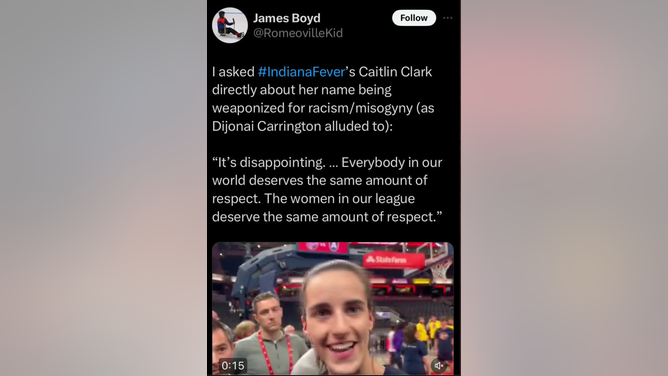Reporters Try To Browbeat Caitlin Clark To Acknowledge White Privilege
A pair of writers for The Athletic tried to pressure Caitlin Clark into condemning observers who've noticed the obvious: there are women in the WNBA, particularly black women, who share a disdain for her.
First up is a reporter by the name of Jim Trotter. Trotter is suing the NFL Network, claiming he was laid off because he's black. He now works for The Athletic.
On Thursday, during the shootaround, Trotter asked Clark to comment on pundits "weaponizing" her name for the "culture war."
"It’s not something I can control, so I don’t put too much thought and time into thinking about things like that; and, to be honest, I don’t see a lot of it. Like I’ve said, basketball is my job," Clark responded.
"Everything on the outside, I can’t control that, so I’m not gonna spend time thinking about that. People can talk about what they wanna talk about, create conversations about whatever it is; but I think for myself, I’m just here to play basketball. I’m here to have fun. I’m trying to help our team win."
You can see a clip of the exchange here.
Clark's answer prompted Sun forward DiJonai Carrington – the player only known for mocking Clark after fouling her earlier this week – to call out Clark for her "silence."
"Dawg. How one can not be bothered by their name being used to justify racism, bigotry, misogyny, xenophobia, homophobia & the intersectionalities of them all is nuts. We all see the sh*t. We all have a platform. We all have a voice & they all hold weight. Silence is a luxury."
Somehow, Carrington attended Stanford.
Then came an unknown blogger named James Boyd, whose faux-sophistication is amusing.
He followed up Trotter's question, this time telling Clark that people have "weaponized her name" for "racism and misogyny."
"Yeah, I think it’s disappointing," Clark responded. "People should not be using my name to push those agendas."

(We had to screenshot Boyd's post as he blocked both the outlet and the author of the story, despite us never hearing his name until Thursday. Video of the exchange can be seen here.)
You might wonder to whom exactly The Athletic, a New York Times-owned publication, is referring. The only notable media brands to criticize the likes of Reese, Carter, and Carrington are OutKick, Clay Travis, and Jason Whitlock – granted our coverage has other media outlets very, very upset.
The media at large, including WNBA broadcast partner ESPN, has overwhelmingly sided with the black players who've picked a fight with Clark.
Black women in the WNBA have targeted, mocked, and aggressively hip-checked Clark. They have downplayed her popularity as a product of "white privilege," a lie we can easily disprove.
And yet, according to The Athletic, the black women are the victims and Clark should stick up for the women targeting her.
It's all such a lie.
No one with any substantial platform or reach is "weaponizing" Clark against black or gay women.
Thus, hosts at ESPN cite randos on X as proof of their accusations against Clark and her fans.
Very few people dare to say this, but it's undeniable: the toxicity around Caitlin Clark emanates predominantly from black women and black media figures taking issue with a little white girl from Iowa ascending atop a historically black sport.
They can't stand it. They also can't stand Nikola Jokic winning NBA MVPs.
Unfortunately, we fear the race bullies are winning.
Clark did her best not to bow to the mob on Thursday. Her answers were classy, as per usual. But the pressure is mounting – the pressure to cave, that is.
On Monday, we published a column titled "WNBA Mean Girls Won't Accept Caitlin Clark Until She Apologizes For Being White and Straight." We noted how the black women of the WNBA accepted Sparks guard Cameron Brink, who is white, because she showed faux remorse for her skin color.
"I will acknowledge there’s a privilege for the younger white players of the league," Brink said earlier this month.
Let us explain:
Women in the WNBA suffer from a variant of white derangement syndrome (WDS). WDS allows its carriers to accept white people if and only if they use their platform to lend credence to an in-vogue agenda – in this case, the black and lesbian agenda.
The only way the race bullies on the court and in the media will ease their hostility toward Clark is if she comes out in support of the narrative that white women have it better in the WNBA – like Brink, Sue Bird, and Diana Taurasi have.
As we noted, Clark wouldn't be the first famous white person to succumb to the race mob. It worked for Howard Stern and Mark Cuban. The race mob now leaves them alone.
Clark is just 22 years old. Resisting the browbeating she's receiving from players and reporters cannot be easy. And due to racial double standards, a straight white woman can't safely condemn the obvious racial animosity she faces.
Thereby, it's hard to envision the drama surrounding Caitlin Clark ending well. How could it?
She's either going to be seriously injured on the court by some vulture like Chennedy Carter, smeared as a racist by the rabble-rousers in the media, or cave and accept a role as a woke activist.
As for the two reporters who pressured her to acknowledge a lie, Jim Trotter and James Boyd, I ask you to acknowledge your own skin color privilege. Were racial tensions not so high, neither one of you would have a platform to continue spewing hate-inciting racial lies.